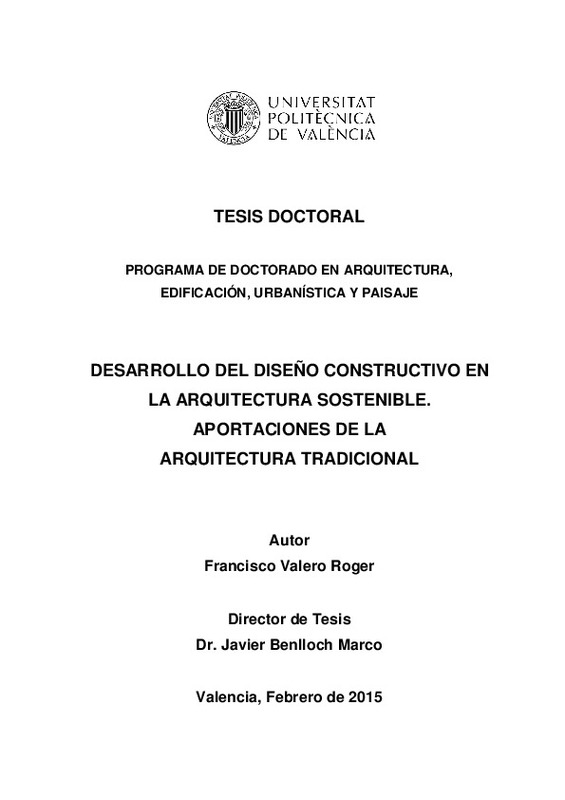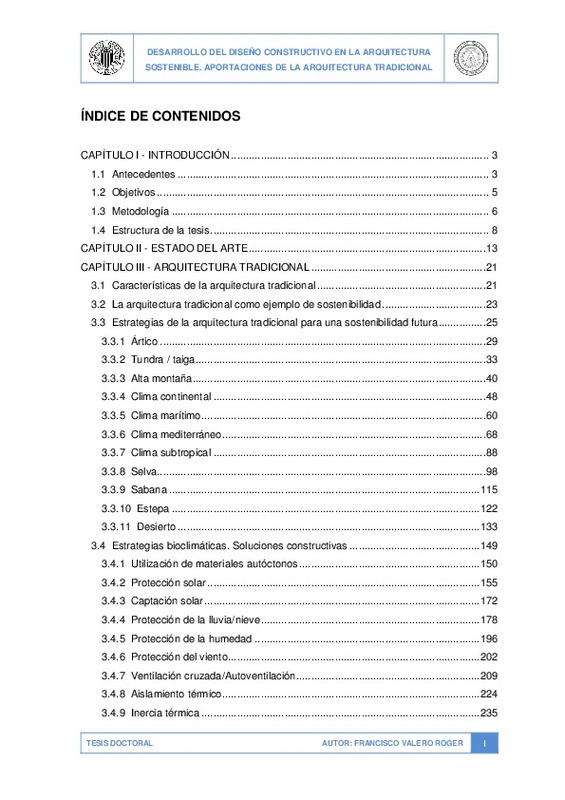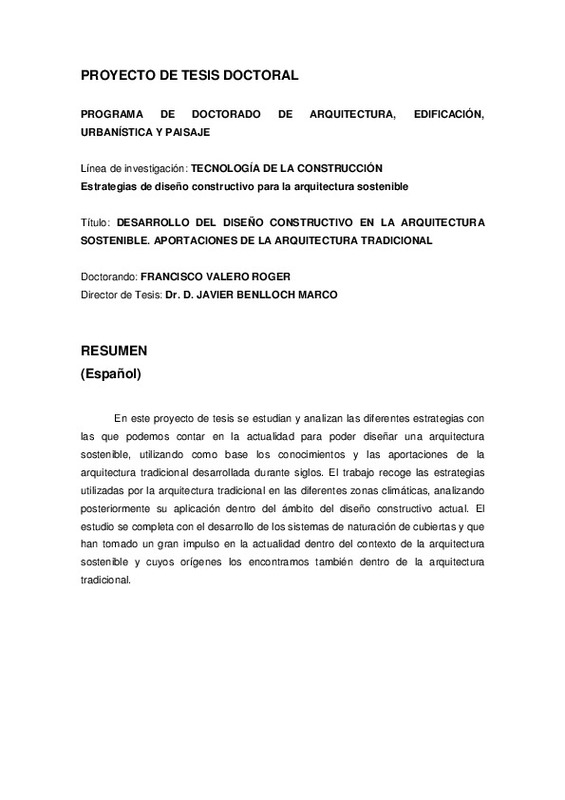- RiuNet repositorio UPV
- :
- Investigación
- :
- Tesis doctorales
- :
- Ver ítem
JavaScript is disabled for your browser. Some features of this site may not work without it.
Buscar en RiuNet
Listar
Mi cuenta
Estadísticas
Ayuda RiuNet
Admin. UPV
DESARROLLO DEL DISEÑO CONSTRUCTIVO EN LA ARQUITECTURA SOSTENIBLE. APORTACIONES DE LA ARQUITECTURA TRADICIONAL
Mostrar el registro sencillo del ítem
Ficheros en el ítem
| dc.contributor.advisor | Benlloch Marco, Javier
|
es_ES |
| dc.contributor.author | Valero Roger, Francisco
|
es_ES |
| dc.date.accessioned | 2015-04-14T07:41:08Z | |
| dc.date.available | 2015-04-14T07:41:08Z | |
| dc.date.created | 2015-03-27 | es_ES |
| dc.date.issued | 2015-04-14 | es_ES |
| dc.identifier.uri | http://hdl.handle.net/10251/48805 | |
| dc.description.abstract | [EN] The present investigation has as main target to define the bioclimatic strategies responsible for the constructive design in the sustainable architecture, from different constructive solutions coming from the traditional architecture and that survive at the moment. For that reason, a wide and initial study of the traditional architecture has been carried, contemplating its response to the environment in which it has been developed, starting off of three basic parameters: the place, the climate and the predominant material. These always present parameters, have conditioned during centuries the form of building of the Man, as we have being forced to develop different constructive typologies that will allow us to achieve adequate comfort conditions, although they do not correspond with the current ones. Through the study of traditional architecture most of representative constructions are described within each of the climatic zones of the Earth, analyzing what factors have led man to adopt different responses when constructing. Once the study is completed, an identification is need to determine the wide range of constructive solutions that define each one of the bioclimatic strategies of the traditional architecture. From this analysis, it is determined what constructive solutions are currently incorporated into the design of a sustainable architecture, taking into account that we are talking about a combination of concepts and traditional criteria with modern techniques and materials. To conclude, it is important to stress out that this investigation pretends to confirm that we can build in a sustainable way, recognising and valuing the work and the experience accumulated during centuries by the Humanity, it does not seem until now that we have taken into account its contributions. Although we have always been able to count on them, yet they are not included in the approach of most of the current projects. | en_EN |
| dc.description.abstract | [ES] La presente investigación tiene como objetivo principal definir las estrategias bioclimáticas responsables del diseño constructivo en la arquitectura sostenible, a partir de diferentes soluciones constructivas procedentes de la arquitectura tradicional y que sobreviven actualmente. Para ello, en primer lugar se realiza un estudio previo y amplio de la arquitectura tradicional, de su respuesta ante el medio en el que se desarrolla, partiendo de tres parámetros básicos: el lugar, el clima y el material predominante. Estos parámetros siempre presentes, han condicionado durante siglos la forma de construir del hombre, estando obligado a desarrollar diferentes tipologías constructivas que le permitieran alcanzar unas condiciones de confort adecuadas, aunque no se correspondan con las actuales. A través del estudio de la arquitectura tradicional se describen las construcciones más representativas dentro de cada una de las zonas climáticas de la tierra, analizando qué factores han llevado al hombre a adoptar diferentes respuestas a la hora de construir. Una vez finalizado dicho estudio, se procede a identificar el amplio abanico de soluciones constructivas que definen cada una de las estrategias bioclimáticas de la arquitectura tradicional. A partir de dicho análisis, se determinan qué soluciones constructivas se incorporan actualmente en el diseño de la arquitectura sostenible, teniendo en cuenta que hablamos de una combinación de conceptos y criterios tradicionales con técnicas y materiales actuales. Para concluir, indicar que la investigación pretende confirmar que podemos construir de forma sostenible, reconociendo y valorando el trabajo y la experiencia acumulada durante siglos por el hombre, ya que quizás hasta ahora, no parece que hayamos tenido muy en cuenta sus aportaciones. Aunque siempre hemos podido contar con ellas, no se incluyen en el planteamiento de la mayor parte de los proyectos actuales. | es_ES |
| dc.description.abstract | [CA] La present investigació té com a objectiu principal definir les estratègies bioclimàtiques responsables del disseny constructiu en l'arquitectura sostenible, a partir de diferents solucions constructives procedents de l'arquitectura tradicional i que sobreviuen actualment. Per a això, en primer lloc es realitza un estudi previ i ampli de l'arquitectura tradicional, de la seua resposta davant del mig en què es desenrotlla, partint de tres paràmetres bàsics: el lloc, el clima i el material predominant. Estos paràmetres sempre presents, han condicionat durant segles la forma de construir de l'home, estant obligat a desenrotllar diferents tipologies constructives que li permeteren aconseguir unes condicions de confort adequades, encara que no es corresponguen amb les actuals. A través de l'estudi de l'arquitectura tradicional es descriuen les construccions més representatives dins de cada una de les zones climàtiques de la terra, analitzant quins factors han portat a l'home a adoptar diferents respostes a l'hora de construir. Una vegada finalitzat el dit estudi, es procedix a identificar l'ampli ventall de solucions constructives que definixen cada una de les estratègies bioclimàtiques de l'arquitectura tradicional. A partir del dit anàlisi, es determinen quines solucions constructives s'incorporen actualment en el disseny de l'arquitectura sostenible, tenint en compte que parlem d'una combinació de conceptes i criteris tradicionals amb tècniques i materials actuals. Per a concloure, indicar que la investigació pretén confirmar que podem construir de forma sostenible, reconeixent i valorant el treball i l'experiència acumulada durant segles per l'home, ja que potser fins ara, no pareix que hàgem tingut molt en compte les seues aportacions. Encara que sempre hem pogut comptar amb elles, no s'inclouen en el plantejament de la major part dels projectes actuals. | ca_ES |
| dc.language | Español | es_ES |
| dc.publisher | Universitat Politècnica de València | es_ES |
| dc.rights | Reserva de todos los derechos | es_ES |
| dc.subject | Arquitectura tradicional | es_ES |
| dc.subject | Arquitectura sostenible | es_ES |
| dc.subject | Clima | es_ES |
| dc.subject | Ambiental | es_ES |
| dc.subject | Diseño. | es_ES |
| dc.subject.classification | CONSTRUCCIONES ARQUITECTONICAS | es_ES |
| dc.title | DESARROLLO DEL DISEÑO CONSTRUCTIVO EN LA ARQUITECTURA SOSTENIBLE. APORTACIONES DE LA ARQUITECTURA TRADICIONAL | es_ES |
| dc.type | Tesis doctoral | es_ES |
| dc.identifier.doi | 10.4995/Thesis/10251/48805 | es_ES |
| dc.rights.accessRights | Abierto | es_ES |
| dc.contributor.affiliation | Universitat Politècnica de València. Escuela Técnica Superior de Arquitectura - Escola Tècnica Superior d'Arquitectura | es_ES |
| dc.description.bibliographicCitation | Valero Roger, F. (2015). DESARROLLO DEL DISEÑO CONSTRUCTIVO EN LA ARQUITECTURA SOSTENIBLE. APORTACIONES DE LA ARQUITECTURA TRADICIONAL [Tesis doctoral]. Universitat Politècnica de València. https://doi.org/10.4995/Thesis/10251/48805 | es_ES |
| dc.description.accrualMethod | TESIS | es_ES |
| dc.type.version | info:eu-repo/semantics/acceptedVersion | es_ES |
| dc.relation.pasarela | TESIS\9025 | es_ES |
Este ítem aparece en la(s) siguiente(s) colección(ones)
-
Tesis doctorales [5389]










